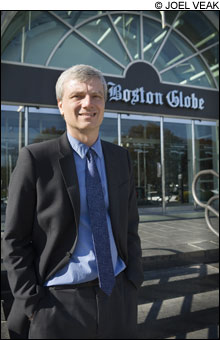
OP HEAD: New editorial-page editor Peter Canellos brings a new aesthetic — and sharper rhetorical elbows — to the back of the Globe. |
It’s been three months since Peter Canellos replaced Renée Loth as editor of the Boston Globe’s editorial page. In that time, readers have received a bevy of cues that, on Canellos’s watch, the paper’s op-ed section will be a radically different beast — marked by a new aesthetic, sharper rhetorical elbows, and a contrarian streak that just might challenge the long-standing conflation of the Globe with knee-jerk liberalism.My own “Eureka!” moment came in late August, when I flipped to the back of the “A” section and found myself staring — right in the middle of the editorial page — at a picture of Leon Wieseltier, literary editor of the New Republic, slack-jawed and hoisting a hefty glass of white wine. The image itself was noteworthy: under Loth (who, like Canellos, is a Phoenix alum), the editorial hole was reliably a prose-only zone.
The snarky tone of the accompanying commentary — which mocked Wieseltier for a recent foray into Boston-bashing — was even more striking. In a column by the New York Times’ Maureen Dowd, Wieseltier had been quoted likening the Internet to “closing time at a blue-collar bar in Boston. Everyone’s drunk and ugly and they’re going to pass out in a few minutes.”
Cue the Globe’s editorial retort, which was craftily titled “Elitist Opinion: This Grudge Is for You.” Therein, the Globe compared Wieseltier to Frasier Crane, pop culture’s best-known effete intellectual snob, and ridiculed his fondness for chardonnay. (And you thought the Budweiser reference was gratuitous!) The piece closed with a modest proposal: “Bostonians will work on holding back their Sam Adamses and Harpoons and Washingtonians can work on holding back Leon Wieseltier.”
When people think of the Globe’s op-ed pages, they don’t usually think of populist pugnacity. But the Wieseltier piece wasn’t an anomaly. Instead, it hinted at Canellos’s broader vision for the section.
Start with the specific fight the editorial page chose to pick. According to the entrenched stereotypes, Wieseltier was an unlikely target. After all, he’s a member of the East Coast liberal establishment — and so are the members of the Globe’s editorial board (or so the thinking goes). But Canellos seems determined to prove that, conventional wisdom notwithstanding, the Globe editorial page isn’t reflexively liberal (my phrase, not his). “Our positions,” he says, “should reflect the general posture of Massachusetts citizens and Globe readers, which is definitely on the liberal side, but is also independent.”
Globe bashers — many of whom seem not to actually read the paper — may find this implausible. Of late, however, Globe editorials have panned the Boston Teachers Union, ripped President Barack Obama’s recent foray into economic protectionism, and whacked Acting US Attorney Michael Loucks for dropping an illegal-marijuana-possession charge against Atlantic senior editor Andrew Sullivan. Bear in mind, too, that the paper’s August 27 editorial on Ted Kennedy’s death began with the following provocative assertion: “Ted Kennedy was not a great man.”